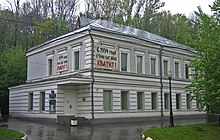Sakharov Center
| Музей и общественный центр имени Андрея Сахарова Museum and Social Center "Andrei Sakharov" |
|
|---|---|
| purpose | Human rights |
| Chair: | SM Lukaschewski |
| Establishment date: | 1996 |
| Seat : | Moscow, Semljanoj wal 57/6 |
| Website: | http://www.sakharov-center.ru/ |
The Sakharov Center ( Russian Музей и общественный центр им. Андрея Сахарова ) is a museum and cultural center in Moscow near the Kursk train station . It shows exhibitions on the subjects of human rights , repression and the gulag in the USSR and the memory of Andrei Sakharov . It is open Monday through Saturday and entry is free.
aims
The aim of the center is to keep alive the memory of "tens of millions of victims of political oppression and crimes committed by the Soviet regime." In contemporary Russia, the aim is to consolidate and consolidate the "values of an open democratic society and an open democratic state, for which Sakharov stood up" particularly advocates intellectual and political freedom and an open exchange of views in a civil society .
history
In 1989 the Sakharov Foundation (social commission for the preservation of the legacy of Andrei Sakharov ) was founded by Jelena Bonner . In 1994 an archive with 100,000 documents was opened.
In 1996 the museum and social center for peace, progress and human rights "Andrei Sakharov" was created in Moscow. Its seat was a two-story house with a total area of 500 m², which the Moscow city administration made available for 25 years. A former garage with an area of 140 m² was converted into an exhibition hall.
On December 25, 2014, the Foundation was entered in the Register of Foreign Agents at the Ministry of Justice. Legal proceedings are currently ongoing against this.
activities
The museum has a permanent exhibition as well as changing exhibitions. The archive contains documents on the history of political resistance in the USSR and repression with the GULAG system. The library contains around 15,000 books and other media. Lectures, discussions, readings and other events take place daily.
Exhibitions
Permanent exhibitions
- Mythology and ideology of the USSR
- Political repression in the USSR
- The way through the GULAG
- Andrei Sakharov - personality and fate
"Caution! Religion "(2003)
On January 14, 2003 the exhibition “Attention! Religion ”, opened. It showed contemporary art that took a critical and sometimes provocative position on religious content. Four days later, exhibits were damaged or destroyed by militant visitors. After that, the exhibition was closed against the wishes of the artists.
On February 12, 2003 , the Russian Parliament (the Duma ) called on the Prosecutor General's Office to take action against the organizers of the exhibition. Only 2 of the 267 MPs present voted against the Duma resolution and the instruction of criminal proceedings. One of them, Sergei Yuschenkow , who had declared at the lectern that the birth of the totalitarian state under the leadership of the Orthodox Church, was murdered a few weeks later in Moscow. The director of the Sakharov Center and the main defendant, Yuri Samodurov , refrained from bringing a civil suit against the intruders because of the damage caused to the museum by this act. As a result, the museum's lawyers were not allowed to enter the courtroom. The social defenders of the accused were the well-known human rights activists Alexander Podrabinek , Lev Ponomarev and Evgeni Ichlow , as well as Sergei Kowalev . Samodurov and Lyudmila Vasilovskaya, who is responsible for exhibitions at the Sakharov Center, were fined 100,000 rubles (approx. EUR 2,900) each on March 28, 2005.
The court hearing against the curators of the exhibition “Attention, Religion!” And “Forbidden Art 2006” as well as against three members of Pussy Riot ( Marija Aljochina , Jekaterina Samuzewitsch and Nadezhda Tolokonnikowa ) because of the “ Punk Prayer ” was held from 1-3. March 2013 in the form of a re-enactment by Milo Rau under the title The Moscow Trials . This theatrical trial also took place in the Sakharov Center.
Web links
- Sakharov Center in Moscow (Russian)
- For the exhibition "Attention! Religion" (2003) (Russian)
- Focus on "Religion and State in Russia", with appreciations for the exhibition "Attention! Religion" and documentation , magazine Eastern Europe , issue 4/2004
- Russia scene. Organized baiting. The climate for non-conformist artists is getting frostier by Boris Schumatzky in Neue Zürcher Zeitung , April 15, 2005
swell
- ↑ Michail Ryklin : With the right of the strong. Russian culture in times of “controlled democracy” Suhrkamp 2006, pp. 45, 12, 45, 49, 24. ISBN 3-518-12472-2
- ↑ Michail Ryklin: With the right of the strong. Russian culture in times of “managed democracy” Suhrkamp 2006, p. 21.
- ↑ Svetlana Boym: The Paradoxes of Freedom in Post-Soviet Russia. In: Back from the future. Eastern European Cultures in the Age of Post-Communism. Edited by Boris Groys, Anne von der Heiden, Anja Herrmann, Peter Weibel, Julia Warmers. Frankfurt / Main: Suhrkamp, 2006, pp. 168–192, pp. 187–188. ISBN 3-518-12452-8
- ↑ Michail Ryklin: With the right of the strong. Russian culture in times of “managed democracy” Suhrkamp 2006, p. 24.
- ↑ Michail Ryklin: With the right of the strong. Russian culture in times of “controlled democracy” Suhrkamp 2006, pp. 27, 23.
- ↑ Michail Ryklin: With the right of the strong. Russian culture in times of “controlled democracy” Suhrkamp 2006, pp. 35, 37.
- ↑ Frida Thurm: The Moscow Trials - Putin against Pussy Riot 1: 1 . Time online . March 18, 2014. Retrieved March 23, 2014.
- ↑ Cheeky women and fornication . The world. March 23, 2014. Accessed March 23, 2014.
Coordinates: 55 ° 45 ′ 4.2 " N , 37 ° 39 ′ 31.7" E
